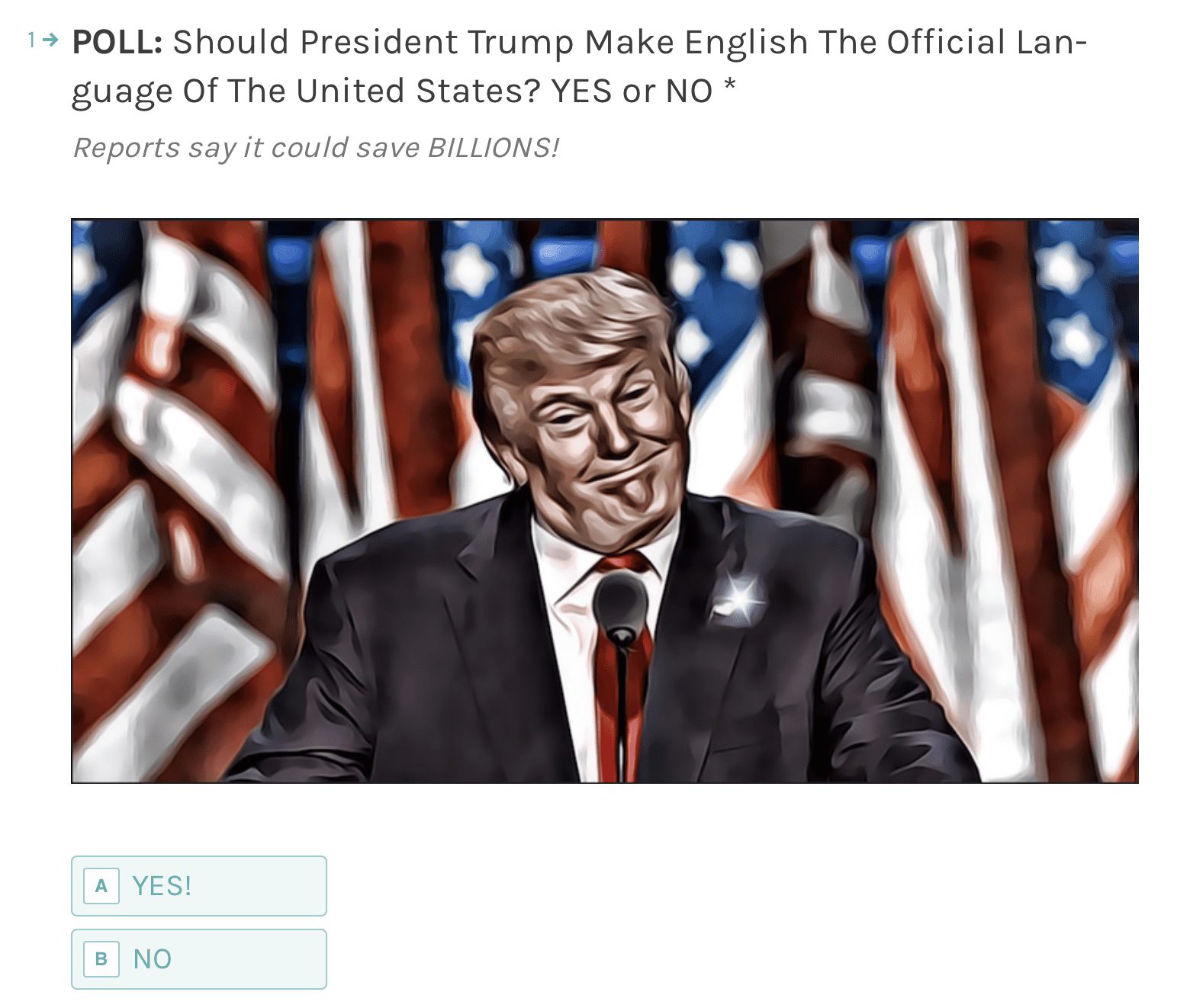If you’ve ever dialed a phone number only to hear “Press 1 for English, 2 for Spanish” then you’ve likely experienced the Federal Government’s LEP Program.
It all stems from an Executive Order President Clinton signed on his way out of office in 2000.
From LEP.gov:
On August 11, 2000, the President signed Executive Order 13166, “Improving Access to Services for Persons with Limited English Proficiency” (PDF). The Executive Order requires Federal agencies to examine the services they provide, identify any need for services to those with limited English proficiency (LEP), and develop and implement a system to provide those services so LEP persons can have meaningful access to them. It is expected that agency plans will provide for such meaningful access consistent with, and without unduly burdening, the fundamental mission of the agency. The Executive Order also requires that the Federal agencies work to ensure that recipients of Federal financial assistance provide meaningful access to their LEP applicants and beneficiaries.
To assist Federal agencies in carrying out these responsibilities, the U.S. Department of Justice has issued a Policy Guidance Document, “Enforcement of Title VI of the Civil Rights Act of 1964 – National Origin Discrimination Against Persons With Limited English Proficiency” (2002 LEP Guidance). This LEP Guidance sets forth the compliance standards that recipients of Federal financial assistance must follow to ensure that their programs and activities normally provided in English are accessible to LEP persons and thus do not discriminate on the basis of national origin in violation of Title VI’s prohibition against national origin discrimination.
And here's the thing, according to the Washington Times, the program is costing BILLIONS annually.
Anywhere from $2 billion or more annual, according to this Washington Times, and they estimate that since George W. Bush, taxpayers have spent over $30 billion on the program, take a look:
There’s no telling how much money the government could save if it were to stop asking Americans to “Press 2 for Spanish.”
What is clear, according to those pushing the change, is that President Trump could do it with the stroke of a pen. Why he hasn’t done so remains shrouded.
Since the dawn of the 21st century, the U.S. government has operated under mandatory translation rules for its documents and services, a pricey option that President Bill Clinton imposed via executive order near the end of his tenure in August 2000.
In essence, the order meant that if a person with limited or no English language skills had a problem with accessing federal services, then that was the government’s problem.
Mr. Clinton’s move “required federal agencies to examine the services they provide, identify any need for services to those with limited English efficiency (LEP), and develop and implement a system to provide those services so LEP persons can have meaningful access to them,” according to the description provided at LEP.gov, a website created to help the process.
The last time federal officials took a look at the cost, during the first term of President George W. Bush, the Office of Management and Budget fixed it at $2 billion annually. If that price has held steady, then it would mean taxpayers have shelled out more than $30 billion on mandated translations of the government’s business.
That bill is simply for translating documents and requiring translators in any domestic government action. The U.S. spends hundreds of millions of dollars more with contractors to the military and intelligence agencies, and the cost has ballooned since the Sept. 11, 2001, terrorist attacks.
Those pushing for English to be made the official language of the U.S. say that’s outrageous.
Stephen Guschov, executive director of ProEnglish, said it’s time to repeal the Clinton order.
“The government must stop placing this onerous and costly translation and interpretation burden on Americans, and President Trump has the ability to do so on a speedy basis via a new executive order,” he said.
This would seem ripe for the Trump administration.
Mr. Trump has often expressed his opinion that English is an important component of assimilation for immigrants. During his time in Congress, Vice President Mike Pence co-sponsored the English Language Unity Act five times.
The act has been introduced again this year in both the House and the Senate, led by Sen. James M. Inhofe, Oklahoma Republican.
Administration staffers had five meetings with ProEnglish last year, but they produced no indication of whether the administration would support either chamber’s bill.
“The 2018 meetings were productive, informative and helpful,” said Mr. Guschov, declining to offer specifics.
The White House did not respond to questions.
Opponents say removing accommodations for non-English speakers would marginalize them.
They say it also would clash with the country’s history of accommodation dating back to the time when the Constitution was printed in German and Dutch, catering to non-English-speaking populations in Pennsylvania and New York.
The Justice Department’s immigration court system now has translation capability for 350 languages.
Although Mr. Clinton’s executive order covers all tongues, Spanish is the most prevalent one given the demographics of immigration and the emergence of entire communities where there is no need to learn English.
“This is driven by immigration policy, not a lack of declarations,” said Mark Krikorian, executive director of the Center for Immigration Studies. “If you are going to take in 1 million people a year, every year, from abroad, you are going to end up with a multilingual country.”
The Conservative Tribune had more:
The federal government recently shut down after Congress refused to approve the $5.7 billion requested by President Trump for a border wall … but what if it could be funded by ending one wasteful government program being used by foreigners?
A report from The Washington Times has revealed that billions and billions of dollars have been spent providing language support to non-English speakers. Most of those, ironically enough, speak Spanish — and Trump could redirect that funding with a few signatures from the Oval Office.
Back in August of 2000, less than six months before President Bill Clinton left office, he signed an executive order regarding “limited English proficiency,” or LEP. In basic terms, Clinton declared that it was the government’s job to make sure that people who don’t speak English could access federal services.
You might have run into LEP before. If you’ve ever heard an automated message ask you to “press 2 for Spanish” or something similar when calling a government agency, there’s a good chance that came about because of the Clinton-era order.
But as always, there was a catch. It turns out that providing countless translations and duplicate systems in languages other than English can get very expensive.
“The last time federal officials took a look at the cost, during the first term of President George W. Bush, the Office of Management and Budget fixed it at $2 billion annually,” reported The Times.
“If that price has held steady, then it would mean taxpayers have shelled out more than $30 billion on mandated translations of the government’s business,” the newspaper continued.
Yes, in a twist of irony, the southern border wall could have been funded five times over using the money being poured into government translation services for Mexicans and other foreigners. And that $2 billion-per-year will likely increase as more immigrants flood the country.
“Although Mr. Clinton’s executive order covers all tongues, Spanish is the most prevalent one given the demographics of immigration and the emergence of entire communities where there is no need to learn English,” The Times explained.
Now, critics of LEP are pointing out that it may be a perfect time to make English the official language of the United States, and end the wasteful spending being used to accommodate millions of immigrants.
“The government must stop placing this onerous and costly translation and interpretation burden on Americans, and President Trump has the ability to do so on a speedy basis via a new executive order,” declared Stephen Guschov, who runs the advocacy group ProEnglish.
One of the big problems with LEP is the “slippery slope.” When officials decide that the government must provide services in one foreign language, they don’t stop there, but keep expanding the program until hundreds of languages from Spanish to Swahili must be supported by the government. Where does it end?




Join the conversation!
Please share your thoughts about this article below. We value your opinions, and would love to see you add to the discussion!